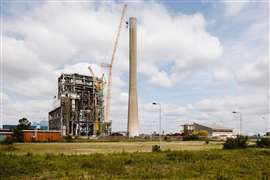Read this article in 中文 Français Deutsch Italiano Português Español
Brazil: Infrastructure investment slowly recovering
19 November 2024
Brazil has experienced more than its share of crises in the last decade, but stability is returning and, with it, increased investment in infrastructure, reports Andy Brown.
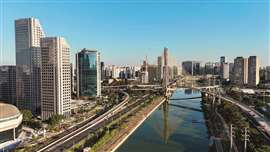 Sao Paulo is the biggest city in Brazil, with an estimated population of around 11.5 million people (Photo: AdobeStock)
Sao Paulo is the biggest city in Brazil, with an estimated population of around 11.5 million people (Photo: AdobeStock)
Brazil is a huge country of many contrasts and is the economic driving force of South America. The construction industry is one of the most important sectors regarding the country’s Gross Domestic Product (GDP), with the sector estimated to make up around 6% of GDP.
The World Bank reports that Brazil’s real GDP expanded 2.9% in 2023 driven by robust private consumption, supported by a strong labour market, fiscal stimulus, and a favourable external environment benefiting the country’s exports. GDP in 2024 is expected to grow by 1.7% with growth of around 2% predicted in the medium term for the country.
According to a report from Global Data, the construction industry in Brazil is expected to grow by 5.1% to reach US$128 billion in 2024. The report said that, “Despite near-term challenges in certain construction sectors, medium to long term growth story in Brazil remains intact. The construction industry in Brazil is expected to grow steadily over the next four quarters.”
The report added that it expected this growth momentum to continue over the forecast period, recording a compound annual growth rate (CAGR) of 4.5% from 2024-2028 and that construction output in Brazil would reach US$153 billion by 2028
According to data from the Brazilian Chamber of the Construction Industry (CBIC), the Brazilian construction industry is projected to grow by 2.3% in 2024. Like the rest of the construction industry around the globe, a lack of skilled workers is an issue.
CBIC estimates that there is a significant increase in the number of professionals needed, particularly in the second half of the year. This surge is primarily due to the launch of new government-funded projects.
In order to meet this demand, construction organisations are said to be prioritising employee training and the implementation of advanced mechanisation techniques, such as automation.
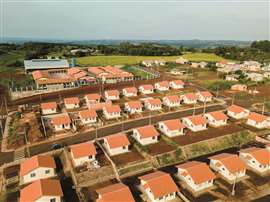 The revival of the Minha Casa Minha Vida housing programme has had a positive impact on the country’s residential construction sector (Photo: AdobeStock)
The revival of the Minha Casa Minha Vida housing programme has had a positive impact on the country’s residential construction sector (Photo: AdobeStock)
Rising costs are another universal issue that the Brazilian construction sector is not isolated from. In terms of costs, the sector experienced some stability in the first quarter of 2024. The Broad National Consumer Price Index rose by 1.42%, and the National Construction Cost Index increased by 0.68%.
However, costs still remain high, posing a challenge for the industry.
The Luiz Inácio Lula da Silva administration has increased infrastructure investments under the federal investment programme, known as Growth Acceleration Programme (PAC), launched last year. This involves public-private partnerships (PPPs) and concessions.
Residential is a key construction sector, and it was recently given a boost with the revival of the Minha Casa Minha Vida (MCMV) housing programme. MCMV was Brazil’s first nationwide house building programme. It was launched in 2009 with the aim to build 3.4 million new homes across Brazil before being stopped in 2016 as the government at the time looked to reduce its expenditure, before being relaunched last year with new rules.
In 2023, more than 21,000 housing units were delivered and another 22,000 that has been suspended had their works resumed. The goal of the Federal Government is to guarantee the contracting of two million new projects by the year 2026.
Controversial road
One project that has recently been given the green light is a controversial road through the Amazon rainforest with Brazil’s President Luiz Inacio Lula da Silva committing his government to finishing the BR-319 road through part of the Amazon rainforest.
The 918km (570 miles) road was built in the 1970s but part of the road is unpaved and therefore unpassable, with the jungle said to have grown on many sections of the road. As much of 400km (248.5 miles) is said to be a ‘dirt road’ that turns to impassable mud in the rainy season.
The road connects the state capital Manaus to Porto Velho, the capital of Rondonia state. Due to droughts in the Amazon region many rivers in the area are now unable to be used, which has increased the pressure on the government to finish the road.
To finish the highway, at least two bridges would need to be repaired, and a new bridge constructed.
Environmental campaigners say that finishing the road will lead to environmental destruction.
A study led by the Federal University of Minas Gerais previously estimated that the project would result in a fivefold rise in clearing by 2030, the equivalent of an area larger than the US state of Florida.
Lula’s Environmental Minister Marina Silva opposed the highway, saying it was not viable in economic and environmental terms. However, a Transport Ministry working group has concluded that the road was viable.
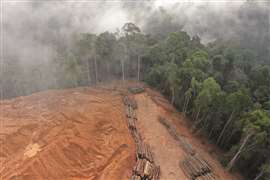 President Luiz Inacio Lula da Silva has committed his government to finishing the BR-319 road through part of the Amazon rainforest (Photo: AdobeStock)
President Luiz Inacio Lula da Silva has committed his government to finishing the BR-319 road through part of the Amazon rainforest (Photo: AdobeStock)
OEMs target Brazil
An indication of the growing importance of the Brazilian market can be seen by the increasing numbers of OEMs that are investing in the region. For example, JCB recently announced that it is to invest 500 million reais (just under US$100 million) on modernising and expanding its Latin American operations.
The UK-based construction equipment manufacturer said it wanted to double the size of its operations by 2030. The majority of the funds, around 360 million reais (US$52.9 million) will be allocated to expanding operations, with 150 million reais (US$27.9 million) earmarked for modernising the factory in Sorocaba, São Paulo.
Another 50 million reais (US$9.3 million) will be invested in the development of new products and the localisation of some equipment, while another 50 million reais will be channelled through the distributor network.
Adriano Merigli, president of JCB Latin America, said that 2023 was the second-best year for JCB in Brazil, with 3,500 machines sold in the domestic market. He said the company planned to grow by another 10% this year, while the sector overall is expected to grow by around 5%. He also expected growth in all sectors, with construction currently accounting for 40% of sales, agribusiness 25% and equipment rental companies 20%.
JCB currently employs 600 people in Latin America but expects to add another 300 direct positions, along with another 700 indirect jobs.
“Earlier this year, we completed an investment cycle of 120 million reais that began in 2021. We are now entering a new cycle with a modernisation phase that will enhance our capacity and productivity,” said Merigli.
Another OEM has also recently invested in the region with Develon, formerly known as Doosan Construction Equipment, opening a new Parts Distribution Centre (PDC) for the Brazilian market at Jundiaí, close to the city of São Paulo.
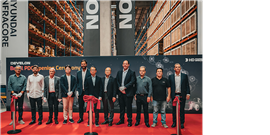 Develon is one of the many OEMs increasing investment in Brazil (Photo: Develon)
Develon is one of the many OEMs increasing investment in Brazil (Photo: Develon)
The new facility in Jundiaí is the first in South America for the OEM and the eleventh worldwide as Develon looks to continue its Global PDC Footprint expansion strategy.
Young-cheul Cho, CEO of HD Hyundai Infracore (HDI), the parent company of Develon, said that there were “growing opportunities” in Brazil.
Speaking at the opening of the new PDC he said, “We value Brazil to the utmost and its importance is growing more and more, along with its great potential in terms of both its people and its natural resources.
“Having seen the growing opportunities in this country, we are here today to fulfil our promise made two years ago to our staff and customers to open the new PDC in the country.”
The new facility will enable parts to be available quicker for customers throughout the country, via the company’s network of dealers.
Trade show success
M&T Expo, a trade fair for machinery and equipment for construction and mining in Latin America, has estimated that approximately BRL 9 billion (US$1.7 billion) of business was generated by the event.
The figure of BRL 9 billion represents approximately 25% of the expected sales for the year in the equipment market. It is a big increase from the previous edition of the fair, held in 2002, that estimated the business started during the event at BRL 2.8 billion (US$548 million).
The show – which took place between April 23 and 26, at the São Paulo Expo, Brazil – had around 500 exhibitors from around the world and received 67,465 qualified visits, with professionals from approximately 80 countries.
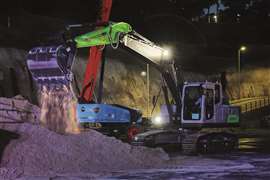 An excavator at M&T Expo – US$1.7 billion of business was said to be generated by the event (Photo: MIT Expo)
An excavator at M&T Expo – US$1.7 billion of business was said to be generated by the event (Photo: MIT Expo)
“The fair highlighted the importance of the machinery market for the socio-economic development of Latin America,” said Rolf Picker, CEO of Messe Muenchen do Brasil, organizer of the fair.
“This expectation shows the optimism and confidence of the sector that the planned investments in infrastructure for the coming years will be achieved. It was a true celebration for the entire ecosystem involving construction and mining equipment.”
In the opinion of Afonso Mamede, president of the Brazilian Association of Technology for Construction and Mining (Sobratema), an institutional partner of the fair, M&T Expo showed the market’s appetite for acquiring launches and innovations in equipment. “This year the scenario is positive for our sector, as new infrastructure concessions are expected, as well as works by the municipal, state and federal governments, such as the PAC.”
STAY CONNECTED


Receive the information you need when you need it through our world-leading magazines, newsletters and daily briefings.
CONNECT WITH THE TEAM










